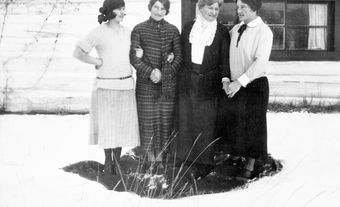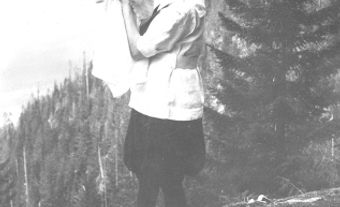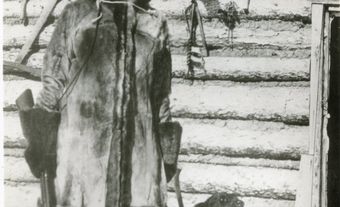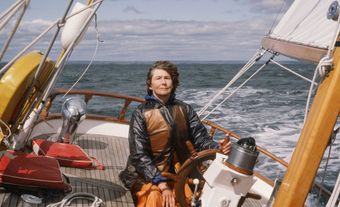Georgina Binnie-Clark, farmer, women’s rights advocate, author (born 25 April 1871 in Sherborne, England; died 22 April 1947 in London, England). Unlike men at the time, as a single woman, Georgina Binnie-Clark was not eligible to receive a free homestead in Western Canada. Instead, she purchased a farm near Fort Qu’Appelle, Saskatchewan. With no background in agriculture, she set out to prove that farming could provide single women with independence. An advocate for women’s issues, she led the campaign calling for homesteads for women. She promoted British immigration to Canada and farming for single women in articles and lectures.

Historical Context: Women and Homestead Eligibility
Under the Dominion Lands Act (1872), the head of a family, or any single man or woman aged 21 years old or older was eligible for a free homestead (less a $10 administration fee). Homesteads were a late 19th and early 20th-century initiative by the Canadian government to attract immigrants to settle in Western Canada. Homesteaders received a quarter section (160 acres) of land and had to build a house and cultivate the land for at least three years.
Between 1872 and 1876, around 150 women claimed homesteads. In 1876, the Act was amended so that only the sole head of a family or any male over 18 were eligible. This change excluded most single women, as they were not the head of a household, meaning that primarily widowed women with children were eligible, and in some cases, divorced or separated women with children. In 1919, war veteran widows also became eligible.
Women could claim homesteads in the United States and Australia, and some took that opportunity. But if women wanted to farm in Canada, their options were to purchase land from the Canadian Pacific Railway, from vacating homesteaders or from veterans of the South African War who received a land scrip for their service.
Immigration to Canada
Georgina Binnie-Clark was born on 25 April 1871 in Sherborne, England, the third of at least six children. Her parents owned and operated an inn. In 1905, Binnie-Clark and her younger sister Ethel traveled to Canada to visit their brother Louis, who owned a homestead farm near Fort Qu’Appelle, Saskatchewan. During this visit, Binnie-Clark became interested in homesteading. Despite not having any training or background in agriculture, she decided to remain in Canada. As a single woman, she did not qualify for a free homestead from the Canadian government. Instead, she purchased a farm near Fort Qu’Appelle from vacating homesteaders in 1905.

Farming
As a single woman farmer, Georgina Binnie-Clark was a rarity on the Canadian Prairies in the early 20th century. She sought to prove that farming could be a means for single women, particularly gentlewomen from Britain, to secure independence. As she had to purchase her land, rather than receiving a free homestead, Binnie-Clark was under more financial pressure to ensure her farm was a success. However, she did have the advantage of having purchased a farm that had already been planted, so she did not have to start from scratch as other homesteaders did. Binnie-Clark’s sister Ethel joined her on the farm, and by 1930 the sisters were working 275 acres. While she faced many challenges and obstacles in her journey to manage a farm, to Binnie-Clark, farm work was preferable to domestic work, claiming in a local newspaper: “Men place land labour as the bottom degree of toil because it is the hardest they have experienced; had they performed household work for the briefest period they would know how much harder and more trying is the woman's task.”
Campaigning
Georgina Binnie-Clark led the movement to promote women homesteaders in Canada. In 1908, she visited government officials in Ottawa and began lobbying to make single women eligible as part of the Canadian homestead legislation. In 1913, Binnie-Clark embarked on a lecture circuit in England, speaking about the role that English women could play in the development of Canada. She wrote about both subjects in publications in Canada and England. The homesteads for women movement was closely linked with other women’s causes in the Prairies at the time, including women’s suffrage and dower rights. Ultimately, Binnie-Clark’s campaign for homesteads for women was not the success she had hoped for. Similarly with women’s suffrage, the First World War hindered the homestead campaign, although advocacy continued into the 1920s. Homestead rights were eventually granted to single women in 1930, but by that time the majority of the land had been claimed.
Imperialism was closely tied to Binnie-Clark’s advocacy for women homesteaders. Like the suffragists, Binnie-Clark and other women who supported women homesteaders used race and ethnicity to advance their cause. Their push for women’s rights was rooted in the idea that British women were superior to “foreign” (i.e., non-British) men. While her campaign for women homesteaders waned, Binnie-Clark continued to advocate for British emigration to Canada through 1930.
Binnie-Clark also advocated for the Canadian government to establish experimental farms to train women farmers. By 1910, she had established her own training program for women on her Saskatchewan farm, and recruited young women from England. The program ran until the outbreak of the First World War.
Writing
Georgina Binnie-Clark detailed her experiences in Canada in two books. The first was Summer on the Canadian Prairie (1910), a travel book. Her second, more prominent book was Wheat and Woman (1914), which recounted the challenges she faced as a single woman farmer on the Prairies. Parts of Wheat and Women use an unreliable narrative and Binnie-Clark changed the names of people featured in the book. However, it is a useful source of information about daily life and society on a homestead farm, including descriptions of early 20th-century farming techniques. In the book, she also critiqued the exclusion of single women in homestead laws and encouraged women to find a living and independence in farming.
England
During the First World War, Georgina Binnie-Clark used her farming experience to work with the British Ministry of Labour to organize women agricultural workers as part of the war effort. From the 1920s until her death in 1947, she spent time in both Canada and England.

 Share on Facebook
Share on Facebook Share on X
Share on X Share by Email
Share by Email Share on Google Classroom
Share on Google Classroom



